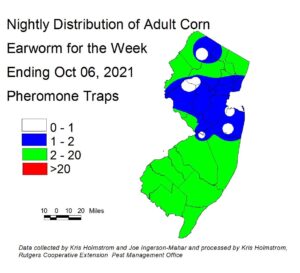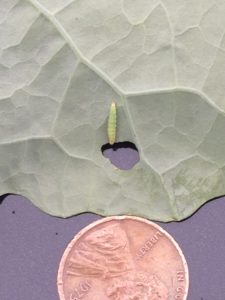Registration and housing for the 2022 Commodity Classic is now open. America’s largest farmer-led agricultural and educational experience will be held Thursday, March 10 through Saturday, March 12 in New Orleans, LA.
agricultural and educational experience will be held Thursday, March 10 through Saturday, March 12 in New Orleans, LA.
Early discounts on registration end Jan. 21, 2022.
Commodity Classic brings the agriculture industry together again in-person for the annual showcase of ag technology, crop production science, marketing intelligence, and farm innovation.
Commodity Classic features a schedule of over 50 educational sessions, a huge trade show with over 350 exhibitors featuring the latest technology, equipment and innovation, top-notch entertainment, inspiring speakers, unique tours, and the opportunity to network with thousands of farmers from across the nation.
A schedule of events is available at the Commodity Classic webpage.
Established in 1996, Commodity Classic is America’s largest farmer-led, farmer-focused agricultural and educational experience. It is presented annually by the American Soybean Association, National Corn Growers Association, National Association of Wheat Growers, National Sorghum Producers, and the Association of Equipment Manufacturers.
Vegetable Crops Edition
Seasonal updates and alerts on insects, diseases, and weeds impacting vegetable crops. New Jersey Commercial Vegetable Production Recommendations updates between annual publication issues are included.
Subscriptions are available via EMAIL and RSS.
Quick Links:
 NJ Commercial Vegetable Production Recommendations
NJ Commercial Vegetable Production Recommendations
 Rutgers Weather Forecasting - Meteorological Information important to commercial agriculture.
Rutgers Weather Forecasting - Meteorological Information important to commercial agriculture.
Commodity Classic Conference, March 10-12, 2022 in New Orleans
Nematodes in Atlantic Soybean Production Webinar
Nematodes consistently rank as a top yield robber of soybeans. Join us November 16 from 9:00 AM-12:00 for the Nematode in Atlantic Soybean Production Webinar to discuss nematode distribution and management strategies for the region. The webinar is free, but registration is needed for access to the zoom link. Registration information can be found at https://www.pcsreg.com/nematodes-in-atlantic-soybean-production-webinar. Topics of emphasis will include updates from regional nematode distribution surveys, assessment of soybean cyst nematode seed treatments, root knot nematode on-farm field trials, general management strategies, and how to collect and submit soil samples. Please email Alyssa Koehler akoehler@udel.edu with any questions.
Bees, Wasps, And Hornets In The Agriculture Workplace
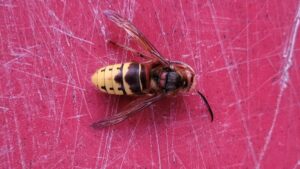
European Hornet Photo by Sal. Mangiafico
The website, Insect Identification.Org has a list of eighty seven Hymenoptera species found in New Jersey. Hymenoptera are ants, bees, wasps, and sawflies. It’s quite amazing that these species have been apart of the evolutionary record for more than 260 million years. Many are predatory species that feed on other insects. And not surprisingly at first glance, several insects have evolved camouflage to look like the stinging biting insects we learn to avoid. There are currently three theories to explain these body shapes and coloring choices. Mimicry, Masquerading, and what I would call ‘Mob Camouflage’ for lack of a better term as the authors of A Hypothesis to Explain Accuracy of Wasp Resemblances’ state.
Mimicry by less aggressive wasps and non-stinging insects like moths is known as Batesian mimicry and Müllerian mimicry. Batesian mimicry is a phenomenon observed by Sir Henry Walter Bates a British Naturalist who studied butterflies in the late 19th century. In Batesian mimicry, non-harmful species known as the mimic have evolved to model the appearance of a species whose potential predators have learned is harmful (venomous sting, biting injury, poisonous) and thus avoid consuming.
Müllerian mimicry is named after German naturalist Fritz Müller and involves two different but similar species purposefully mimicking each other’s appearances and bad taste to confuse predators.
A third hypothesis proposed in the 2016 paper ‘A Hypothesis to Explain Accuracy of Wasp Resemblances’ suggests that non-aggression by wasps towards sisters during hunting is innate and on sight and is a means to confuse or slip by the sight of the selecting agent (the bird) in a crowd.
A good example of these three adaptations on display in 2021 was the emergence of cicada broods and multiple grasshopper broods. These species are food for many Hymenoptera species and when food is abundant bee, wasp and hornet populations soar. This resulted in significant number of calls to extension offices for assistance in identifying similar patterned species. Many callers wanted to know if their hornet encounter was an asian giant hornet (Vespa mandarinia), a new introduction first found in the Pacific Northwest in 2019 that is not known to be present elsewhere in the U.S. at this time.
On another note, it remains to be seen if any of these common predatorory wasp and hornets develop a taste for spotted lanternflies. In their native range, the parasitic wasp Dryinus browni has developed a taste for lanternflies and biologists are studying the logistics of bringing this species to the U.S. The gypsy moth Ooencyrtus kuvanae introduced to the U.S. in 1908 has also been observed to prey on lanternflies.
Another surprising revelation about mimicry in wasp species, is that for some of these common North American species, both prey and predator can change their color banding from yellow and black to red and black as their range changes. Species commonly seen as yellow and black in New Jersey are red and black in Florida and most likely do so to maximize the benefits of mimicry, masquerade, and mob camouflage relative to the abundance of one particular color pattern over another in that ecological niche. As much of the work force in hand harvest agriculture migrates with the crop harvest, workers maybe familiar with the same species venomous sting but associate it with a different color pattern as seen in a different region or country.
Regardless of where in the world we are from, vertebrates like ourselves innately associate these color patterns with avoidance. In human societies, these warning stripes are incorporated into clothing and infrastructure as social cues to both protect the wearer (safety vests) and alert others to safety hazards.
General Body Color Pattens in Stinging and Non-Stinging Bees, Wasps, and Hornets
Green Body and Yellow: Three different types of sweat bees, cuckoo wasp
Red and Black: Red velvet wasp also known as ‘cow killer’ or as ‘red velvet ant’
Yellow and Black: Eastern yellow jacket hornet, southern yellow jacket hornet, common yellow jacket wasp, asian horntail, five-banded thynnid wasp, ichneumon wasp, hyperparasitic wasp, leucospid wasp, bumble bee, pigeon tremex, square head wasp, weevil wasp
Yellow and Brown: Cicada wasp, paper wasp, european hornets, long tailed ichneumon wasp
Black and White: White faced hornets, mason wasp, leaf cutter bee, potter wasp, scoliid wasp
Brown and Black: Great golden digger wasp, honey bee
Have specific questions about these species or want to learn more? Check out the research at the Department of Entomology at Rutgers https://entomology.rutgers.edu/ and faculty and research program focus at https://entomology.rutgers.edu/personnel/faculty.html or find an extension pest specialist at https://entomology.rutgers.edu/personnel/research-extension-staff.html.
Several companies have published wall posters available on the internet of common bees, wasps, and hornets that may be useful in the workplace. These visual aids would be a useful addition to worker bulletin boards in facilities processing the preferred sugar source (vegetable sugars) many of these species feed on throughout the summer.
Concerned about severe reactions to bee, wasp, ant, or hornet stings? Here is an informative article by Merk Manual https://www.merckmanuals.com/home/injuries-and-poisoning/bites-and-stings/bee,-wasp,-hornet,-and-ant-stings?redirectid=12.
The CDC has an employer fact sheet on how to reduce worker exposure to stinging members of the bee, wasp, and hornet families. https://www.cdc.gov/niosh/topics/insects/beeswasphornets.html.
Talk to your occupational health nurse about adding over the counter antihistamines like diphenhydramine, famotidine, and prescription epinephrine to your agriculture workforce first aid kit. Bee venom medical alert necklaces, bracelets and arm bands can be worn by hyper-sensitive workers in the workforce to aid in rapid response if someone is stung and unable to articulate they need medical attention.
Lastly, keep in mind that as climate changes, the seasons become longer, and temperatures are more favorable to yielding higher populations of queens and workers, the time frame to destroy nests when stinging flying insects are hybernating is also changing.
Stay Safe on the Road During the Harvest
Autumn is harvest season on the farm, and farmers are rushing to get the harvest in before the weather becomes cold. With harvest season getting underway, more heavy farm equipment is going to be out on the same roads as vehicle traffic, going from field to field, dramatically increasing the odds for accidents. During this season, it is important to be aware of the increased possibility of accidents and injury, especially when using farm machinery. One area to pay particular attention to is road safety while moving equipment. Here are some tips to help make sure the season is safe.

USDA Photo by Preston Keres
Make sure your farm vehicles and equipment are visible.
- Verify that all lights and flashers on your farm vehicle are working properly.
- Use warning flashers, flags, lights and slow-moving vehicle emblems on all equipment.
- Apply reflective tape to machines to improve visibility for motorists at dusk.
- Avoid traveling before dawn and after dusk if you can. If you need to drive during these times, ensure that your headlights are working. Headlights help you see and be seen.
- Consider the use of an escort vehicle following with lights and flashers
Also, make sure you know the size of all tractors, vehicles and equipment. Be mindful of the height of your farm equipment and avoid power lines, low bridges and other overhead obstacles. Remember to communicate with fellow motorists on the road. Use turn signals and hand signals whenever possible to communicate with fellow drivers. Avoid distractions and make safety a priority on the road. Also, particularly important is to pay attention to when you are feeling tired and fatigued. Taking a break to rest is an important safety tool not to be overlooked.
This post was written by Bill Bamka, County Agricultural Agent with RCE-Burlington County.
ALERT – Alternaria leaf spot active on fall cole crops.
Alternaria leaf spot has been reported on broccoli this week. Weather conditions for the development of both diseases has been ideal. Preventative control is recommended and growers should scout and apply protectant fungicides on a regular basis. Note, if Downy mildew is present use downy mildew specific fungicides in conjunction with fungicides for Alternaria leaf spot control. For more information on controlling Alternaria and Downy mildew, please see the 2020/2021 Commercial Vegetable Production Recommendations.
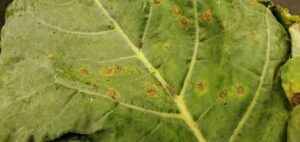
Alternaria leaf spot infection. Note the yellow halo around each spot. Under ideal conditions black concentric rings will develop within each spot. These rings are the conidia which are then spread causing new leaf spots to develop.
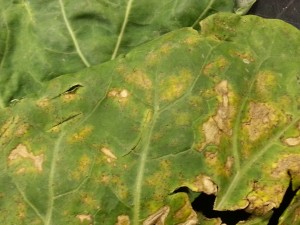
Symptoms of downy mildew on infected chinese cabbage leaf. Note the irregular chlorosis and browning of upper leaf surface. Under ideal conditions the pathogen will produce white spore masses only on the undersides of the leaf.
Vegetable IPM Update 10/06/21
Note: This is the final scheduled edition of the Vegetable IPM Update for 2021.
Sweet Corn
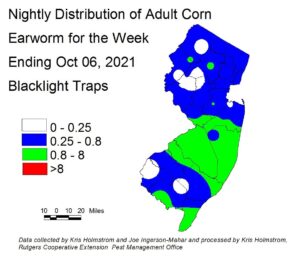 Corn earworm (CEW) moth captures from both trap types continue to decline with low evening temperatures, although the population still poses a threat to remaining sweet corn. It is likely that CEW activity will rise and fall with evening temperatures for the next several weeks. Both trap types throughout the state are generally in agreement as to spray schedules (see below). The number of pheromone traps deployed is much lower, resulting in much broader color bands on the map. It is also important to understand that pheromone traps are more sensitive than blacklight traps, and thresholds are adjusted to account for the higher catches typical of this trap type. On the blacklight map (left), green areas represent a 3-day silk spray schedule, while blue areas on the blacklight map should be represent 4-day schedules. On the pheromone map (below right), red represents a 3 day spray schedule. Green areas on the pheromone map represent a 4-day schedule.
Corn earworm (CEW) moth captures from both trap types continue to decline with low evening temperatures, although the population still poses a threat to remaining sweet corn. It is likely that CEW activity will rise and fall with evening temperatures for the next several weeks. Both trap types throughout the state are generally in agreement as to spray schedules (see below). The number of pheromone traps deployed is much lower, resulting in much broader color bands on the map. It is also important to understand that pheromone traps are more sensitive than blacklight traps, and thresholds are adjusted to account for the higher catches typical of this trap type. On the blacklight map (left), green areas represent a 3-day silk spray schedule, while blue areas on the blacklight map should be represent 4-day schedules. On the pheromone map (below right), red represents a 3 day spray schedule. Green areas on the pheromone map represent a 4-day schedule.
The highest nightly blacklight trap catches of CEW for the week ending 10/06/21 are as follows:
| Crosswicks 6 | Tabernacle 2 | Milltown 1 |
| Downer 2 | Bellemeade 1 | Pennington 1 |
| Georgetown 2 | Green Creek 1 | Princeton 1 |
| Medford 2 | Jones Island 1 | Sergeantsville 1 |
The highest nightly pheromone trap catches of CEW for the week ending 10/06/21 are as follows:
| Woodstown 15 | Tabernacle 12 | Dayton 3 |
| Green Creek 14 | Allamuchy 10 | Snyder Farm (Hunterdon) 2 |
| Monroeville 13 | Berlin 8 | South Branch 2 |
| Tabernacle 12 | East Vineland 8 | Springdale 2 |
Silking Spray Schedules*:
South – 3-4 days
Central – 3-4 days
North – 3 -4 days
*These recommendations are based on regional catches. Adhere to tighter spray schedules if indicated by local trap catches. Synthetic pyrethroids alone should NOT be used for corn earworm (CEW) protection on silking corn, or for fall armyworm (FAW) management at any stage. Control with these materials is very inconsistent. Utilize materials in IRAC groups 5 and 28, or combination products that include IRAC group 28 for best control. See the Sweet Corn section of the 2020-21 Commercial Vegetable Production Guide for selections.
Cole Crops
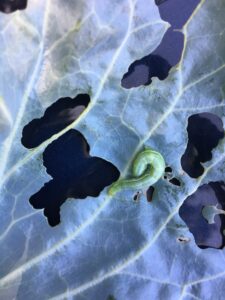 Fall plantings of cole crops continue to be infested by imported cabbageworm (ICW) and diamondback moth (DBM) larvae. With DBM being the most destructive larval type at this time. Cabbage looper (CL-photo at left), cross striped cabbage worm (CSCW-photo at right) and beet armyworm (BAW) see note below)) are also causing
Fall plantings of cole crops continue to be infested by imported cabbageworm (ICW) and diamondback moth (DBM) larvae. With DBM being the most destructive larval type at this time. Cabbage looper (CL-photo at left), cross striped cabbage worm (CSCW-photo at right) and beet armyworm (BAW) see note below)) are also causing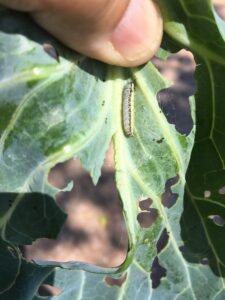 injury to these crops, with CSCW becoming more common.
injury to these crops, with CSCW becoming more common.
Check 5 consecutive plants each in 10 random locations throughout the planting. Consider treating if caterpillars are found on 10% or more plants that are in the 0-9 true leaf stage. From 9-leaf to the early head stage (in broccoli, cauliflower, and cabbage) infestations up to 20% may be tolerated. Once heads begin to form, a 5% threshold should be observed to protect the marketable portion of the plant. For leafy greens such as collards and kale, 10% plants infested is the threshold throughout.
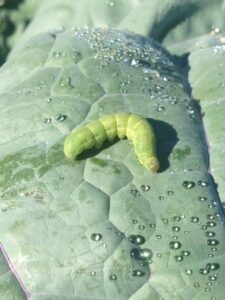 Some populations of DBM are resistant to carbamate and synthetic pyrethroid insecticides. The lack of DBM control with these insecticides has been noted in NJ previously. It is important to distinguish between common cole crop pests for this reason. DBM larvae grow to a length of approximately 0.5”, and taper toward both ends (see photo at right). These caterpillars thrash violently when disturbed. Newer chemistries that specifically target caterpillar pests are effective against DBM as well as all other caterpillar pests of cole crops, including BAW (see photo at left), another species with exhibiting pyrethroid resistance. These materials include (active ingredient – trade name (IRAC* code)):
Some populations of DBM are resistant to carbamate and synthetic pyrethroid insecticides. The lack of DBM control with these insecticides has been noted in NJ previously. It is important to distinguish between common cole crop pests for this reason. DBM larvae grow to a length of approximately 0.5”, and taper toward both ends (see photo at right). These caterpillars thrash violently when disturbed. Newer chemistries that specifically target caterpillar pests are effective against DBM as well as all other caterpillar pests of cole crops, including BAW (see photo at left), another species with exhibiting pyrethroid resistance. These materials include (active ingredient – trade name (IRAC* code)):
Spinosad/Spinetoram – Entrust(OMRI)/ Radiant (5)
Chlorantraniliprole – Coragen (28)
Cyantraniliprole – Exirel (28)
Peppers
Pepper weevil –
No additional farms have been reported as being infested. Currently infested farms are not actively trying to manage the weevil due to the lateness of the season.
A new fact sheet is now available for anyone interested in monitoring for pepper weevils on their own: FS1330: Monitoring and Management of Pepper Weevil in New Jersey (Rutgers NJAES).
Beet armyworm (BAW) captures are fairly low in southern NJ pheromone traps, with the exception of very high catches in the East Vineland area. This pest can attack peppers, and growers and scouts should check for the presence of heavily damaged leaves near terminal growth on pepper plants. BAW larvae will be found in the area of damage. As yet, no injury to peppers has been reported, but BAW are appearing in a number of areas on cole crops and other leafy greens such as chard and beets. Spinach is also a host for this pest, and all of these crops should be inspected regularly for the presence of larvae and feeding.
The highest nightly pheromone trap catches of BAW for the week ending 10/06/21 are as follows:
| East Vineland 95 | Jones Island 3 |
| Folsom 7 | Woodstown 2 |
Allium Leaf Miner
Allium leaf miner (ALM) adults are active now, and adults and injury have been observed on leeks in Hunterdon County. ALM should be considered a threat to late alliums in all parts of the state at this time.
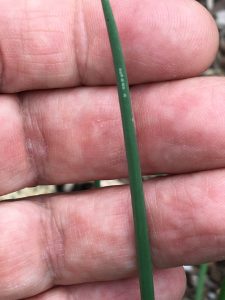 Growers should consider initiating (continuing) the control method of their choice at this time. Affected crops include chives, scallions, garlic, onions and leeks. Look for neat rows of white spots descending from the upper tips of allium leaves (see photo at left). Initial injury often occurs on the tallest leaves. Under warmer, less breezy conditions, adults may be seen near the tips of leaves (see photo of adults at lower right). Click on photos to enlarge the images.
Growers should consider initiating (continuing) the control method of their choice at this time. Affected crops include chives, scallions, garlic, onions and leeks. Look for neat rows of white spots descending from the upper tips of allium leaves (see photo at left). Initial injury often occurs on the tallest leaves. Under warmer, less breezy conditions, adults may be seen near the tips of leaves (see photo of adults at lower right). Click on photos to enlarge the images.
Floating row covers, kept on until this flight ends will help minimize access to plants. Insecticide applications targeting adults may be helpful as well, although weekly sprays may not completely eliminate foliar injury. Spinosyn materials (Radiant, Entrust (OMRI approved)), pyrethroids (Mustang Maxx, Warrior), neonicotinoids (Scorpion, Venom), the diamide Exirel (section 2ee recommendation) and the insect growth regulator Trigard are labeled for leaf miner control.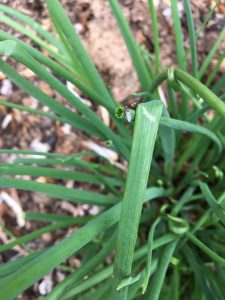
Adult activity and observations of feeding will be reported on in the IPM Update as they occur. At this time, all growers should respond to the second adult generation.
Thank you!!
Once again, Kris Holmstrom and Joe Ingerson-Mahar would like to acknowledge the IPM Field Technicians for this season:
Rhea Bolar
Claire Chapeau
Jeff Kane
Jake Newcombe
Gabriel Torres
Without the assistance of these individuals, much of the information presented in this publication would have been unobtainable. We are grateful for all their help and hard work.
